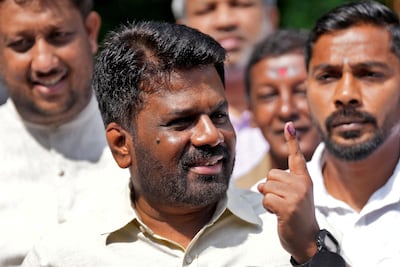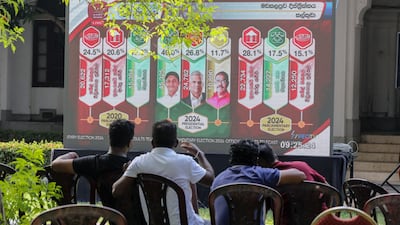A coalition led by Sri Lanka’s new left-leaning President Anura Kumara Dissanayake won a landslide victory in parliamentary elections, giving him the power to bring in promised economic reforms.
The National People’s Power alliance won 141 seats in the 225-member assembly and looked set to secure more as counting of votes continued on Friday. The alliance previously held only three seats in the parliament.
The Samagi Jana Balawegaya led by Sajith Premadasa, son of former president Ranasinghe Premadasa, had secured 35 seats.
Millions of Sri Lankans voted in the snap election on Thursday that was called by Mr Dissanayake less than two months after he was elected on promises of sweeping reforms following the island nation’s worst financial crisis in 2022.
“Thank you to everyone who helped usher in the Renaissance!” Mr Dissanayake said on X.
More than 11 million of the 17 million registered voters turned out, according to the Election Commission of Sri Lanka. More than 8,800 candidates belonging to 49 political parties and 284 independent groups were in the fray.

Mr Dissanayake, 55, popularly known as AKD, from the Marxist Janatha Vimukthi Peramuna party, took office in September after winning more than 55 per cent of votes in a run-off.
Sri Lanka’s tourism industry, accounting for 10 per cent of its gross domestic product, suffered after a series of bombings on Easter Sunday in 2019. At least 269 people were killed in the blasts at three churches and three luxury hotels. The Covid pandemic hit a year later. The country experienced steep inflation and a cash crunch, with acute shortages of fuel and food. By 2022, it had exhausted its foreign reserves and its economy had contracted by 9.5 per cent, according to the World Bank.
The economic crisis prompted large anti-government protests and led to the ousting of president Gotabaya Rajapaksa, who temporarily fled the country.
The outgoing parliament was dominated by the Sri Lanka Podujana Peramuna, or the People's Front, led by Gotabaya Rajapaksa and his younger brother Mahinda, which secured only two seats, the Sri Lankan Election Commission website showed. Mahinda Rajapaksa was serving as prime minister when anti-government protests forced him to resign in 2022, and had previously served as president from 2005 to 2015. Neither of brothers stood for election but Mahinda Rajapaksa's son Namal, a former sports minister, sought re-election to Parliament after losing to Mr Dissanayake in the presidential poll.
Mr Dissanayake's promises to tackle corruption, lower taxes and revive the economy have resonated with younger voters. He has also pledged to abolish the country’s executive presidency, a system under which power is largely centralised under the president.
The President was born into a farming family in Galewela, a multicultural and multireligious town in central Sri Lanka. He started his political journey with the student wing of the JVP, a Marxist-Leninist party that led rebellions in the 1970s and 1980s in which more than 80,000 people died, before renouncing violence.


